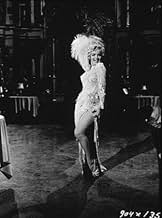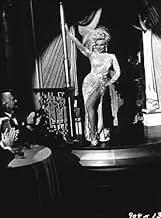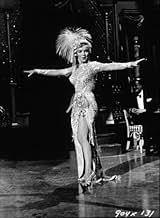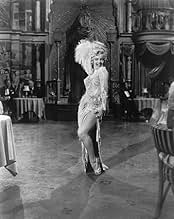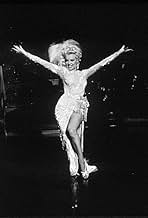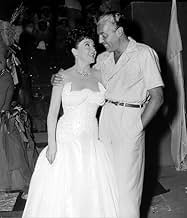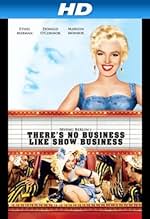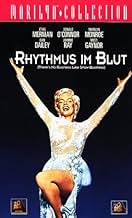IMDb RATING
6.4/10
7.1K
YOUR RATING
A blonde beauty upsets a show business family.A blonde beauty upsets a show business family.A blonde beauty upsets a show business family.
- Director
- Writers
- Stars
- Nominated for 3 Oscars
- 4 nominations total
Dorothy Abbott
- Showgirl
- (uncredited)
Dorothy Adams
- Nurse
- (uncredited)
Robert Adler
- Night Watchman
- (uncredited)
Aladdin
- Orchestra Violinist
- (uncredited)
Fred Aldrich
- Private Detective
- (uncredited)
- Director
- Writers
- All cast & crew
- Production, box office & more at IMDbPro
Featured reviews
The film was, perhaps, the splashiest of the year's musicals
It dealt with the joys, loves and heartaches experienced by a vaudeville family called the Donahues (spending their lives singing and dancing and touring) with Merman and Dailey as mother and father, and Ray, Gaynor and O'Connor as their talented offspring
All of them get to perform a large catalog of new and old songs by Irving Berlin in sumptuous arrangements, beautiful settings and on a big Hippodrome extravaganza
Daily and Merman hit the top; O'Connorwho had liked to build a barbed-wire fence around Marilyndid it Scottish and came with some fine dances; Gaynor's love was dancing and she was really cute; and while Ray got some thinking to do, he sells a very beautiful song ("If You Believe").
Marilyn (appearing after 29 minutes screening) was deliciously charming, seducing and very appealing She sang "After You Get What You Want" and "Lazy," and did that tropical version of 'Heat Wave.'
All of them get to perform a large catalog of new and old songs by Irving Berlin in sumptuous arrangements, beautiful settings and on a big Hippodrome extravaganza
Daily and Merman hit the top; O'Connorwho had liked to build a barbed-wire fence around Marilyndid it Scottish and came with some fine dances; Gaynor's love was dancing and she was really cute; and while Ray got some thinking to do, he sells a very beautiful song ("If You Believe").
Marilyn (appearing after 29 minutes screening) was deliciously charming, seducing and very appealing She sang "After You Get What You Want" and "Lazy," and did that tropical version of 'Heat Wave.'
When Darryl F. Zanuck virtually forced exhibitors and most of his fellow studio mogul rivals to adopt CinemaScope as a panacea for TV's devastation of Hollywood's weekly box office bonanza, he dictated that virtually all of Twentieth's output was to be filmed in that eye-stretching process. "There's No Business Like Show Business," directed by that old pro, Walter Lang, seems to be the prime example of Darryl's minions saying to their boss: "You want wide? We'll give you W-I-D-E!!"
Everything about it was designed and lensed to emphasize the original ratio of the CinemaScope process and viewing it on a video that isn't letterboxed must look like what a one-eyed person must experience in everyday life. I never did see it in a theater but I have seen it on a TV broadcast which more-or-less recreated its widescreen ratio. It's a glorious mish-mash. Every Berlin tune that could be stuffed into it is given at least one run-through; John de Cuir's production design must have occupied every inch of several of Twentieth's West Los Angeles soundstages; Ethel Merman, after her terrific movie repeat of her Broadway success in "Call Me Madam" for Fox (and now, as of 2005, available on video), trumpets away in number after number (Must have been an ear-rending experience over those original four-track stereophonic sound systems.); Dan Dailey, Donald O'Connor and Mitzi Gaynor give it their energetic best; and then there's Marilyn. What can we say, with all that so sadly, in her personal life, came after she reluctantly fulfilled her contractual obligation in this one? She dazzles in, let's face it, a rather vulgar way, and seems shoehorned in to boost the potential box office. And they even added Johnnie Ray, a huge jukebox success at the time (and, due to his hearing deficiency, performing his songs at an even greater volume than La Merman.)
All in all this one shouldn't be missed if you want to view an example of Hollywood at its brassiest, in a production fairly bulging with elements that may not coalesce very harmoniously but which was, no doubt, worth the price of admission to those movie palaces before they were carved up to become the precursors of today's sterile multiplexes.
Everything about it was designed and lensed to emphasize the original ratio of the CinemaScope process and viewing it on a video that isn't letterboxed must look like what a one-eyed person must experience in everyday life. I never did see it in a theater but I have seen it on a TV broadcast which more-or-less recreated its widescreen ratio. It's a glorious mish-mash. Every Berlin tune that could be stuffed into it is given at least one run-through; John de Cuir's production design must have occupied every inch of several of Twentieth's West Los Angeles soundstages; Ethel Merman, after her terrific movie repeat of her Broadway success in "Call Me Madam" for Fox (and now, as of 2005, available on video), trumpets away in number after number (Must have been an ear-rending experience over those original four-track stereophonic sound systems.); Dan Dailey, Donald O'Connor and Mitzi Gaynor give it their energetic best; and then there's Marilyn. What can we say, with all that so sadly, in her personal life, came after she reluctantly fulfilled her contractual obligation in this one? She dazzles in, let's face it, a rather vulgar way, and seems shoehorned in to boost the potential box office. And they even added Johnnie Ray, a huge jukebox success at the time (and, due to his hearing deficiency, performing his songs at an even greater volume than La Merman.)
All in all this one shouldn't be missed if you want to view an example of Hollywood at its brassiest, in a production fairly bulging with elements that may not coalesce very harmoniously but which was, no doubt, worth the price of admission to those movie palaces before they were carved up to become the precursors of today's sterile multiplexes.
20th Century Fox was no match for MGM when it came to musicals. Daryl F. Zanuk decided to gamble with this film where the talents of a Broadway star, Ethel Merman, would be showcased. Ms. Merman in spite of being the toast of Broadway, never made it big in Hollywood. After all, she was not a radiant beauty, but oh, could she belt a song that could be heard at the top of the balcony! Phoebe and Henry Ephron were brought on board to write the screen treatment and Walter Lang directed.
The musical was also blessed in that Irving Berlin's music is heard throughout in all its glory. Ms. Merman was the perfect actress to interpret the songs written by Mr. Berlin. They made a perfect duo, even though, for some viewers not used to Ethel Merman's singing style, it might prove an uneasy combination.
The story is simple enough. It follows the Donahues from the early days of vaudeville through some glittering years after. Molly and Terence Donahue had two sons, Tim and Steve, and a daughter, Katy. As the children grow up, the parents' popularity began to recede. The film deals with Tim, as a young man, as he falls for Vicky Parker, a beautiful singer who makes it big on her own. Vickie, who is more interested in her own career neglects Tim. As a result, Tim goes on his own to find himself, away from his family and Vickie.
The best thing in the film is Ethel Merman. She was a legendary figure and as Molly Donahue, she is at her best. Dan Dailey was the perfect partner for Ms. Merman. Donald O'Connor is also seen doing some fine dancing. Marilyn Monroe was a lovely woman to look at. As a singer, she had a small voice, but she used it well making the songs her own. Mitzi Gaynor plays Katy. Johnnie Ray, a popular singer of that period is terribly miscast. His Steve is the worst thing in the movie.
Although predictable, this film has some great things going for it. Some of the musical numbers are well staged and will not disappoint. On the whole as the camaraderie expressed by the title of the film is evident in the musical.
The musical was also blessed in that Irving Berlin's music is heard throughout in all its glory. Ms. Merman was the perfect actress to interpret the songs written by Mr. Berlin. They made a perfect duo, even though, for some viewers not used to Ethel Merman's singing style, it might prove an uneasy combination.
The story is simple enough. It follows the Donahues from the early days of vaudeville through some glittering years after. Molly and Terence Donahue had two sons, Tim and Steve, and a daughter, Katy. As the children grow up, the parents' popularity began to recede. The film deals with Tim, as a young man, as he falls for Vicky Parker, a beautiful singer who makes it big on her own. Vickie, who is more interested in her own career neglects Tim. As a result, Tim goes on his own to find himself, away from his family and Vickie.
The best thing in the film is Ethel Merman. She was a legendary figure and as Molly Donahue, she is at her best. Dan Dailey was the perfect partner for Ms. Merman. Donald O'Connor is also seen doing some fine dancing. Marilyn Monroe was a lovely woman to look at. As a singer, she had a small voice, but she used it well making the songs her own. Mitzi Gaynor plays Katy. Johnnie Ray, a popular singer of that period is terribly miscast. His Steve is the worst thing in the movie.
Although predictable, this film has some great things going for it. Some of the musical numbers are well staged and will not disappoint. On the whole as the camaraderie expressed by the title of the film is evident in the musical.
The first time you watch this movie, you'll think it's long, boring, and stupid. The second time you watch this movie, you'll love it. I can't begin to tell you why, but it's the truth. (I had the chance to show this film to an audience during a Donald O'Connor film festival. People came up to me weeks later to say that they had caught it again on cable, and loved it the second time through.)
Marilyn is definately "ehh". This movie was filmed during her worst years of personal abuses, and it shows all over her face and her work, lending a shadowy sadness to her character for modern audiences. Donald O'Connor's character also takes on a new depth for modern viewers familiar with his own life's history, oftentimes with a sharp poignance that helps him grab control of so many scenes, and turn his character's story into the strongest sub-plot of the film.
Merman is BRILLIANT as the real head of this family, giving us a wonderfully unique character. Her role as the strong, smart, powerful, and loving mother is truly a standout for the 50's in general, and musicals in particular.
Marilyn is definately "ehh". This movie was filmed during her worst years of personal abuses, and it shows all over her face and her work, lending a shadowy sadness to her character for modern audiences. Donald O'Connor's character also takes on a new depth for modern viewers familiar with his own life's history, oftentimes with a sharp poignance that helps him grab control of so many scenes, and turn his character's story into the strongest sub-plot of the film.
Merman is BRILLIANT as the real head of this family, giving us a wonderfully unique character. Her role as the strong, smart, powerful, and loving mother is truly a standout for the 50's in general, and musicals in particular.
Contrary to what a lot of people seem to think of this film, my biggest complaint with it is Marilyn Monroe. The studio shoehorned her into this film in their attempt to make the biggest musical extravaganza ever, and she just doesn't fit. She's so out of sync with the other characters that she might as well be from a different planet.
Don't get me wrong. I'm not a huge Marilyn fan, but she was good (and well-cast) in "Some Like It Hot". She's just all wrong for "No Business Like Show Business", and she looks and sounds ridiculous.
To be fair, Johnnie Ray often doesn't hold up well before modern audiences, either, when he sings. It's not that he's bad; it's that his style has come and gone and hardly been seen since. Everything in this movie tends to be at least a little overdone, and asking Johnnie Ray to exaggerate his singing does not produce flattering results.
Still, Donald O'Connor and Mitzi Gaynor are as brilliant and exuberant as you could hope. Ethel Merman is, well, Ethel Merman, and exactly right for her part. Dan Dailey is like a reliable locomotive that never disappoints.
The story is a bit plodding at times, but it only exists to set up one gala musical number after another. It only really bogs down when it gets caught up with Marilyn's character. If the studio had just left Marilyn out of it, perhaps giving Mitzi Gaynor the love interest role, and toned down the general effort level just a hair, this would've been one of the all-time greats.
It's still absolutely worth seeing -- in widescreen format, if you possibly can.
Don't get me wrong. I'm not a huge Marilyn fan, but she was good (and well-cast) in "Some Like It Hot". She's just all wrong for "No Business Like Show Business", and she looks and sounds ridiculous.
To be fair, Johnnie Ray often doesn't hold up well before modern audiences, either, when he sings. It's not that he's bad; it's that his style has come and gone and hardly been seen since. Everything in this movie tends to be at least a little overdone, and asking Johnnie Ray to exaggerate his singing does not produce flattering results.
Still, Donald O'Connor and Mitzi Gaynor are as brilliant and exuberant as you could hope. Ethel Merman is, well, Ethel Merman, and exactly right for her part. Dan Dailey is like a reliable locomotive that never disappoints.
The story is a bit plodding at times, but it only exists to set up one gala musical number after another. It only really bogs down when it gets caught up with Marilyn's character. If the studio had just left Marilyn out of it, perhaps giving Mitzi Gaynor the love interest role, and toned down the general effort level just a hair, this would've been one of the all-time greats.
It's still absolutely worth seeing -- in widescreen format, if you possibly can.
Did you know
- TriviaOne day, Marilyn Monroe's husband, Joe DiMaggio, visited the set. He refused to be photographed with Monroe, but insisted on being photographed with Ethel Merman, whom he called "my favorite star."
- GoofsDonald O'Connor wears a gold ring on his left ring finger in almost all of his scenes. The ring is missing when he performs "A Man Chases a Girl (Until She Catches Him)", in the scene with Marilyn Monroe just before that, and in the film's climactic scenes.
Rings are not permanent fixtures, he simply removed the ring at some point and chose to no longer wear it.
- Quotes
Molly Donahue: "Don't worry." Hmm. That's a laugh. You start worrying about your kids the day they're born and you never stop. Even after they bury you, I bet you never stop.
- ConnectionsFeatured in Marilyn (1963)
- SoundtracksWhen the Midnight Choo-Choo Leaves for Alabam'
(uncredited)
Written by Irving Berlin
Performed by Ethel Merman and Dan Dailey
Later performed by Mitzi Gaynor and Donald O'Connor
- How long is There's No Business Like Show Business?Powered by Alexa
Details
- Release date
- Country of origin
- Languages
- Also known as
- El mundo de la fantasía
- Filming locations
- Production company
- See more company credits at IMDbPro
Box office
- Gross worldwide
- $6,341
- Runtime
- 1h 57m(117 min)
- Aspect ratio
- 2.55 : 1
Contribute to this page
Suggest an edit or add missing content



